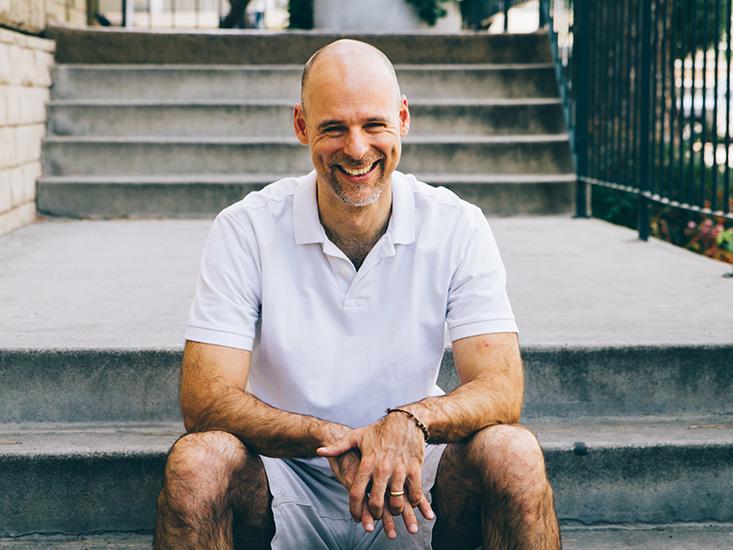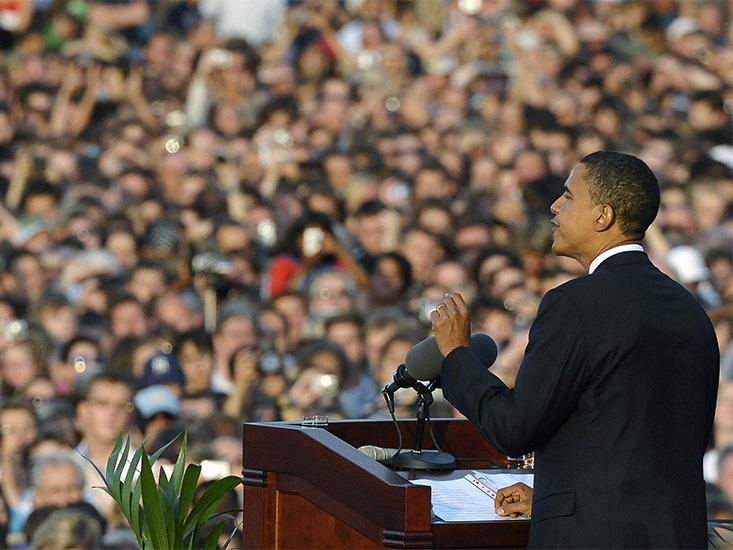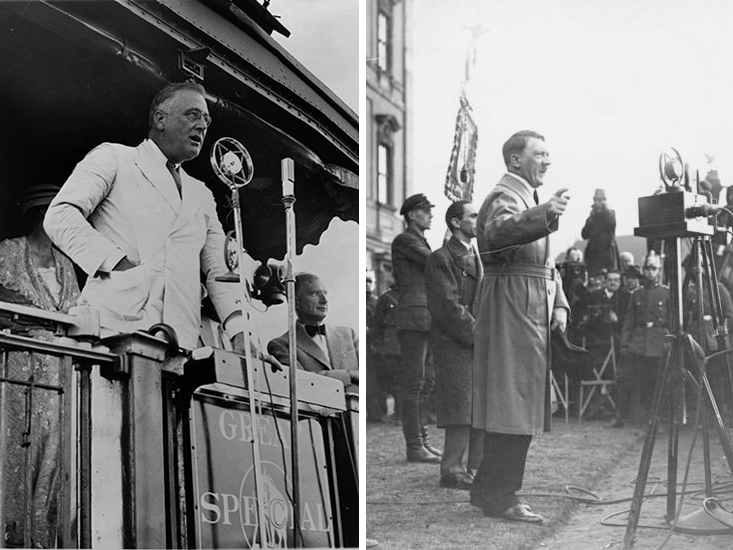For weeks I had been researching what science has to say about the power of charisma. Why do some people so clearly have it and others don’t? Why do we fall so easily under its influence? Charismatics can make us feel charmed and great about ourselves. They can inspire us to excel. But they can also be dangerous. They use charisma for their own purposes, to enhance their power, to manipulate others.
Scientists have plenty to say about charisma. Individuals with charisma tap our unfettered emotions and can shut down our rational minds. They hypnotize us. But studies show charisma is not just something a person alone possesses. It’s created by our own perceptions, particularly when we are feeling vulnerable in politically tense times. I’m going to tell you about these studies and spotlight the opinions of the neuroscientists, psychologists, and sociologists who conducted them.
But first I want to tell you about a magnetic preacher who spent decades wowing audiences in churches across America with the holy words of Jesus. Then he lost his faith and now preaches about how to live happily without God. What scientists study about charisma, Bart Campolo lives.

I first read about the newly non-believing Campolo in The New York Times Magazine last December. “An extreme extrovert, he was brilliant before a crowd and also at ease in private conversations, connecting with everyone from country-club suburbanites to the destitute souls he often fed in his own house,” wrote Mark Oppenheimer. Campolo’s father is Tony Campolo, one of America’s superstar evangelists for the past 50 years, who counseled Bill Clinton through the Monica Lewinsky scandal, and today continues to mobilize people into a movement for Jesus’ messages of love and redemption.
Who would know more about the power of charisma to both charm and deceive than a preacher’s son gone rogue? Campolo, 53, who today volunteers counseling young people as a “humanist chaplain” at the University of Southern California, didn’t disappoint. He was wonderfully frank and engaging, energetic and insightful, just like a, well, evangelical preacher.
The early 20th-century German sociologist Max Weber wrote charisma is a quality that sets an individual “apart from ordinary men,” and causes others to treat him as “endowed with supernatural, superhuman, or at least specifically exceptional powers or qualities.” Such qualities, Weber wrote, “are not accessible to the ordinary person, but are regarded as of divine origin or as exemplary, and on the basis of them the individual concerned is treated as a leader.”
Campolo had long believed that was true. “I was convinced charisma flowed directly from God,” he told me. “It was a gift.” As he began to lose his faith, he said, “I passed through every stage of apostasy on my way to heresy, I slowly left my ability to believe in all this stuff.” He began to preach that charisma may be something you’re born with, but it wasn’t supernatural; you could employ it at will. “You can use it to get women in bed, you can use it to win people down the aisle for Jesus, or you can use it to sell insurance,” Campolo said. What’s more, it was a quality that could, at least in part, be learned and perfected.
Who would know more about the power of charisma to both charm and deceive than a preacher’s son gone rogue?
That was precisely what John Antonakis, a professor of organizational behavior, and the director of the doctoral program in management at the University of Lausanne who has spent years studying charismatic speakers, told me. “Charismatic techniques can be taught,” he said. Antonakis has identified a series of what he calls Charismatic Leadership Tactics (CLTs), which range from the use of metaphors and storytelling to nonverbal methods of communication like open posture and animated, representative gestures at key moments. When taken together, he has shown, they have helped decide eight of the last 10 presidential elections. “The more charismatic leadership tactics used, the more individuals will be seen as leader-like by others,” he said. (Read here how Antonakis breaks down the CLTs of super-popular TV preacher Joel Osteen.)
Tony Campolo had mastered all the tactics. In the 1970s and ’80s, Bart Campolo and his father traversed the country in a beat-up, sky-blue Dodge Coronet, giving sermons wherever they could. Campolo marveled at his father in action. “My dad was one of the most charismatic people in the world,” Campolo said. “I’ve been around black preachers and people like my dad, who can go up and down the spectrum, do the whisper that you can’t help but listen to, tell the joke, then tell the tear-jerking story, and then the fiery fulmination. He can do it all over the map.”
Many of the most important lessons of Bart’s vocation came after the elder Campolo’s sermons were over. That was when Bart’s dad would ask his son what he’d seen, what worked, what didn’t, and why. Like how to read a room.
“You try to figure out who’s the most difficult part of the room,” Campolo said. “Say you’re at a college campus and there’s a bunch of athletes sitting on the back row. If you don’t get to them, they’re going to hurt you all night long.” So before you get up to speak, Campolo said, you go to the back of the room and talk to the potential troublemakers. “You might say, ‘Hey man, why did you choose this school? How did you get here?’ You try to get those people on your side even before you get up on the stage.” Or you seek them out while you’re speaking, making eye contact, reaching directly to them.

Campolo offered another example. “I remember one time I was with my dad and we went to this big music festival and there were probably 10,000 kids on a hillside. There’s Frisbees flying around. There’s all sorts of distractions. The acoustics are such that no matter what you do, the crowd won’t hear itself. He was like, ‘This is going to be tough.’ Then he said, ‘I’m going to get up and the first story I’m going to tell is a heavy, emotional story. If I try humor, since they won’t hear anyone else laughing, they won’t laugh. In a space like this, you have to throw the humor away and go for emotional resonance. You can take a group like this down, but you really can’t take them up.”
Campolo said his dad had a natural gift for leadership. But he was certain where that gift came from. His dad, he said, like another famously charismatic leader, had a desperate need to be liked.
“My dad for a long time was the spiritual advisor to Bill Clinton,” Campolo said. “He and Clinton were and are great friends. I was once in D.C. with my dad and he said, ‘Hey, I’m going to visit the president, you want to come?’ Everybody tells you when you’re in the room with Clinton, you’re the only person in the world. He has this ability, this charisma, that makes you feel like he’s really seeing you, he really feels your pain. Both he and my dad lost their fathers early in life. I think that can create a huge insecurity. It often seems that guys like that need a standing ovation every 10 minutes to feel validated. So that’s part of where charisma comes from. It has to do with the emotional makeup of the person.”
Charisma, though, has two halves. It’s a relationship between the person who possesses it and the people who respond to it. It’s only when the spark meets the kindling that a flame can ignite. A charismatic speaking to a mirror is not particularly exciting. Put one in front of a crowd, however, and you’re in for a show.
Emotion is the accelerant. In a 2005 article in Science, Princeton psychologist Alexander Todorov showed individuals two pictures side by side of competing congressional candidates and asked them to rate their competence solely based on their appearance. Their judgments, which they were capable of forming within a second, predicted with almost 70 percent accuracy which candidate went on to win the election.
“We decide very quickly whether a person possesses many of the traits we feel are important, such as likeability and competence, even though we have not exchanged a single word with them,” Todorov said at the time. “It appears that we are hard-wired to draw these inferences in a fast, unreflective way.” Using functional magnetic resonance imaging, Todorov demonstrated snap judgments carry a powerful emotional charge, as they are associated with activity in the amygdala, a primitive brain structure, the seat of the fight-or-flight response.
You can use charisma to get women in bed, you can use it to win people down the aisle for Jesus, or you can use it to sell insurance.
Jochen Menges, a lecturer in organizational behavior at the University of Cambridge, terms the emotional impact of charisma the “awestruck effect.” He came up with the concept as a doctoral student in 2008, when he traveled to Berlin to hear Barack Obama speak in the hopes he might glean some new insights about how charismatic alchemy worked. When Obama bounded onto the stage and announced he was not just a citizen of the United States, but a citizen of the world, Menges himself was taken in. For a few minutes, Menges forgot why he was there—he was taken out of himself, became a follower.

When he looked around, he was fascinated. Everything he had read on charisma implied leaders worked their magic by making people feel good emotions. But this was not an animated, energized crowd. The entire crowd seemed frozen in place, entranced. Afterward, a woman next to Menges gushed that Obama’s speech was “amazing,” “wonderful,” and “awesome.” Yet when Menges asked her to name three things she liked about the speech, she couldn’t.
In a TED Talk, Menges explained that charismatic leaders put us in awe. “And because we admire them so much, we tend to hold back our emotions in an almost instinctive effort to show our deference to them, to acknowledge their superior status,” he said.
By recreating the “awestruck effect” in the laboratory—by inducing subjects to visualize and write about charismatic figures, and then showing them emotion-laden video clips—Menges demonstrated something profound. While the subjects’ external emotional expression may have been subdued, the subjective emotional experience of those who were “awestruck” was every bit as powerful as those who were not. Indeed, it was more so, as they simply suppressed it out of automatic deference. Psychologists have long known that when we suppress the expression of our emotions, not only do those emotions increase their intensity, but we suffer a cognitive detriment.
Menges found that students were far more likely to report they remembered the exact contents of speeches delivered by individuals who used charismatic speaking techniques that evoke emotions, than the content of speeches from individuals using a straightforward, non-charismatic mode of delivery. Yet written tests revealed those exposed to charismatic speakers remembered far less than those exposed to the non-charismatic speakers. Even so, when offered the chance to follow each speaker into a coffee room to discuss the ideas of their talks, the students almost never followed the boring speaker—and almost always followed the charismatic one.
This does not surprise Richard Boyatzis, who studies organizational behavior, psychology, and cognitive science at Case Western Reserve University. Using fMRI, Boyatzis and Anthony Jack, an experimental psychologist, have demonstrated that emotional speakers engage with a neural pathway called the default mode network (DMN). This pathway, also known as the task-negative network, spans multiple areas of the brain (including the amygdala) and is associated with daydreaming, thoughts about others, and remembering things in the past. Interestingly, its activation is often found to be negatively correlated with the very circuits we rely upon for analytic thinking—those involved in executive functions, planning, reasoning, attention, and problem-solving. “The problem is these two networks have almost no overlap,” Boyatzis said. “They suppress each other.”
In fact, beyond shutting down our ability to reason, some scientists have found that under the right circumstances, charismatics—especially if that charisma stems from our perception of them as a “leader”—can induce a state akin to hypnotism.
Hitler gave people who feel broken a sense of superiority, and the capacity to blame someone for everything gone wrong outside themselves.
In 2011, a team of Danish researchers led by Uffe Schjødt, a neuroscientist at Aarhus University, examined the brains of individuals experiencing one of the most extreme demonstrations of charismatic influence—charismatic healing. To do so, the team recruited 18 devoted, young Christians from faiths with a tradition of intercessory prayer (mainly from the Pentecostal Movement), all of whom reported a strong belief in people with special healing powers. They also recruited 18 secular participants, who did not believe in God and were skeptical that prayer could cause healing.
Both groups of participants were instructed to listen to 18 different prayers performed by three different speakers—and told the speakers were either non-Christian, Christian, or Christians known for having healing powers. The speakers were all unremarkable churchgoers randomly assigned six prayers apiece.
The researchers found profound differences in brain activity based on assumptions made about the speaker. In the Christian subjects, activity spiked in analytical areas of the brain in response to the non-Christian speakers, but plummeted when they listened to the speaker they believed was known for healing powers. These changes were not present in the secular group. The researchers drew parallels to similar experiments done on subjects on hypnosis, noting that hypnotism, when it works, was usually preceded by the massive frontal deactivation—in effect, a “handing over” of executive function to the hypnotist. Further, they found that “the more the Christian participants deactivate their executive and social cognitive networks, the higher they rate the speaker’s charisma post-scan.”
Schjødt explained his findings in the context of a theory called the “predictive coding framework.” The brain is essentially a pattern recognition machine, constantly making predictions. Our perception is a combination of our prior expectations—expressed in the form of these automatic predictions—and actual sensory perception. As long as the sensory information matches the predictions, the brain hums along. When there is dissonance, the brain steps into make a correction. But when we are around people we believe to have special powers or abilities—when we have made an implicit decision that we can trust them—we seem to unconsciously down-regulate our analytical thinking.
“If you expect to experience God, or you are in the presence of a charismatic or religious expert, then you believe whatever is going on is correct, and it will lead you to that particular experience, so you don’t invest too many resources in being skeptical and checking,” Schjødt said.
If charisma is a spark, and a willing audience is the kindling, the right chain of worldly events reveals charisma’s full explosive power. In his book Charisma in Politics, Religion and the Media, David Aberbach zeroes in on historical pivot points that set the stage for transformative events ignited by charismatic leaders.
“Charisma touches something deeper in society, which is not always apparent,” Aberbach told me. “The key is there are some unpredictable elements in the life of a country or the life of a group, and when there are moments of particular distress, then certain individuals come forward who would not have come forward previously. They represent something essential in the capacity to deal with the crisis. There is marriage between what is going on between them internally and whatever is going on externally.”
A charismatic leader, Aberbach said, “releases the individual of the pressures of life under stress. If you join a group in those circumstances, you feel more protected. But that presupposes the vulnerability of the individual. When individuals feel more secure, they have less need for salvation, less need for a charismatic bond. But when they feel vulnerable, then there is a possibility of a charismatic attachment. This can be very dangerous in certain circumstances.”

Aberbach, a noted academic at McGill University and the London School of Economics, points to Franklin Delano Roosevelt and Adolf Hitler—two sides of the historical coin—as telling case studies. They both grew out of Depression-era needs of their respective nations. And they illustrate how profound an influence an individual charismatic can have.
“In the case of Roosevelt, he represented the ability to fight back in time of adversity,” Aberbach said. “On a personal level, he had fought back, and he could represent the nation that was fighting back. As a person, he could represent the group. In that sense, he was charismatic. I think that’s what it comes down to. The nation or the group seeks that person that represents them at a given time, and it’s unconscious.”
In the case of Hitler, Aberbach said, “A lot of people felt good when they heard him. It’s often forgotten because newsreel clips often represent him as a sort of raving lunatic. But in fact people were taken into a different kind of realm, a different kind of existence, where they felt one with Germany, they felt a sense of national pride, they felt an aggressive hope in their future.”
Hitler, Aberbach continued, gave people “a target of hatred, which is a convenient means of giving people who feel broken in life a sense of superiority, and also the capacity to blame someone for everything that has gone wrong outside themselves. He takes away personal responsibility, which is great relief for people who feel burdened by responsibility. They needed to forget, they needed to be transformed in a condition of crisis. That’s why crisis and charisma are so closely linked.”
The scientists agreed that charisma grabbed us on an emotional level. They also agreed snap judgments and subconscious fears could be overcome. In his bestseller Thinking Fast, Thinking Slow, Nobel Prize-winning psychologist Daniel Kahneman outlines two separate parallel decision circuits. The brain’s intuitive system is far faster than the rational system. The intuitive system, though, is prone to unconscious factors, based on limited personal experience and tendencies that result in irrational biases. But the slower, more rational system, centered in our prefrontal cortex, can serve as a potent check on unconscious tendencies—when we take the time to analyze them.
That was the final point Bart Campolo wanted to make about charisma: We could learn not to be taken in.
“You’re not going to stamp out charisma,” Campolo said. “The way to protect people from demagogues is not to kill all the demagogues but rather to teach people how charisma works so they can recognize whether it’s being wielded responsibly or abused. I always think charisma is like fire. You can use it to heat your house or you can use it to burn your house down.”
Adam Piore is the author of The Body Builders: Inside the Science of the Engineered Human.






























